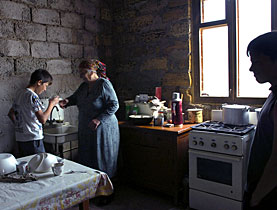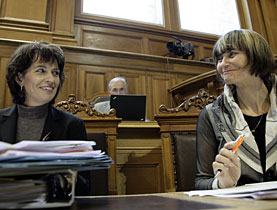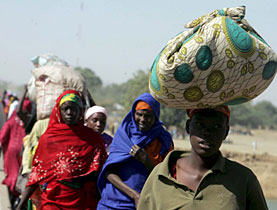Swiss aid lacks coherence, OECD says

The government is facing calls to increase its development aid contributions to improve the coherency and focus of its policy.
The Organisation for Economic Co-operation and Development (OECD) recommends that Switzerland should aim for 0.5 per cent of its Gross National Income (GNI) for aid despite financial constraints.
Eckhard Deutscher of the OECD Assistance Committee, who presented the findings of the report in Bern on Monday, listed six positive aspects and six critical points.
Switzerland was praised notably for focusing its efforts on poverty reduction, its policy of working closely with local authorities and the restitution of stolen assets in line with commitments to development.
“Switzerland’s long tradition of international assistance, its aid to humanitarian causes and multilateral donors serve as lessons of good practice,” an OECD statement said.
However, the committee added that Swiss aid is still spread too widely, directed at too many countries and sectors.
With the United Nations target of 0.7 per cent of GNI in mind, it recommended the government’s financial contribution to development aid be increased.
In 2008, Switzerland spent about SFr2.2 billion ($2.2 billion) – or 0.42 per cent of GNI on aid and surpassed its target set for next year.
Better cooperation
The OECD also invited the government to review its strategic approach, improve the cooperation between the foreign and the economics ministries, as well as strengthen its communication efforts.
“The taxpayer wants to know where his money is going,” Deutscher said.
He added that over all Switzerland was doing well in comparison with many other countries, but that there was room for improvement.
“Nobody is perfect. But it gets eight out of ten points,” he said.
Scandinavian countries in particular excelled with a coherent development aid concept. But many other nations lagged way behind the Swiss and the OECD did not hesitate to point out shortcomings.
Deutscher said Swiss aid could benefit from a clearer geographical and sector focus.
Benchmark
The director of the Swiss Agency for Development and Cooperation (SDC), Martin Dahinden, described the regular OECD peer review as an important element for its work and as a benchmark.
He pointed out that some of the reforms recommended by the OECD committee were underway.
“We will focus on 12 countries and six special programmes in our aid policy by 2012,” Dahinden said, emphasizing that the changes needed time to be implemented.
He underlined the fact that Switzerland’s latest foreign policy report recognised the pivotal role of development aid.
“It is no longer seen just as an instrument of foreign policy. Development aid must also be an element of security, trade, finance, agriculture and environmental matters,” he said.

More
Swiss Agency for Development and Cooperation (SDC)
Quality
He said he was confident that the OECD review would help convince the government to agree to raise the aid quota to 0.5 per cent.
“A report of such depth and conducted before the eyes of other OECD countries and with such positive results is a great asset for us.”
The survey shows that the Swiss provide quality aid that is directly linked to the country’s financial means, according to Dahinden.
For his part Hugo Fasel, director of the church charity Caritas, said he had hoped that the reviewers would be more critical and highlight Switzerland’s banking secrecy and its tax policy.
“The report appears to be too soft with the Swiss government,” he said.
Urs Geiser, swissinfo.ch
In 2008 the Swiss aid volume reached SFr2.2 billion, an increase of more than 6% over the previous year and a total of 0.42% of its Gross National Income (GNI).
Parliament approved an increase to 0.5% by 2015, but the government wants to delay the additional spending because of financial constraints.
The officials United Nations development target is 0.7% of GNI.
The Swiss government’s development aid is managed jointly by the foreign ministry’s Agency for Development and Cooperation (SDA) and the economics ministry’s State Secretariat for Economic Affairs (Seco).
As a rule the development aid policy of OECD member countries is subject to peer reviews every four years.
The Netherlands and Belgium led the latest assessment of Switzerland’s aid policy. The team visited Swiss projects in Albania and Nicaragua.
The first peer review of Switzerland took place in 1960.

In compliance with the JTI standards
More: SWI swissinfo.ch certified by the Journalism Trust Initiative














You can find an overview of ongoing debates with our journalists here . Please join us!
If you want to start a conversation about a topic raised in this article or want to report factual errors, email us at english@swissinfo.ch.